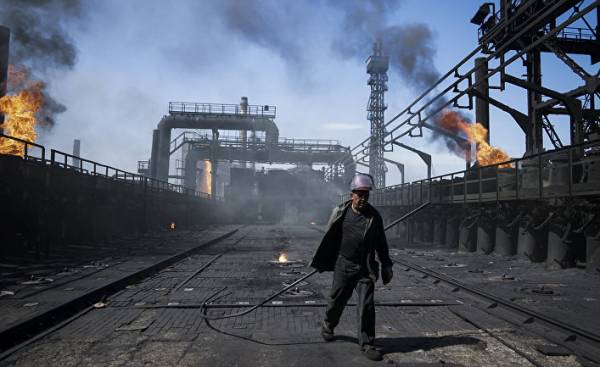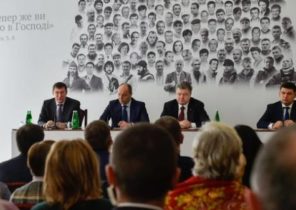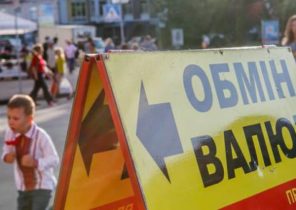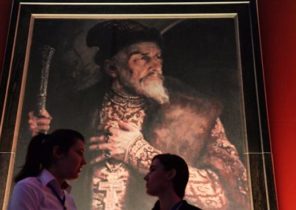
In the front line separating government troops from the militia of the separatists, is the coke plant of Avdeevka, the largest in Europe (6.8 million metallurgical coke per year). He continues to work despite all difficulties. Nine workers died and over 50 were injured in the fighting that began in 2014.
The plant, which is hit by hundreds of shells, belongs to the group “Metinvest” controlled by oligarch Rinat Akhmetov, and is located in the Northern part of the Town. To the South of the city, which in 2013 consisted of 35 thousand people, is the so-called industrial area where you can control a strategic highway, going in the direction of Donetsk, located thirty kilometers to the South.
Stationed in Avdeyevka 72 brigade of the armed forces of Ukraine is that is holding back the militia of the separatists.
Passing through the industrial zone of the front line separated from the coke plant 12 kilometers, but even with its vast territory (339 acres) to go to the shells coming from the enemy. The plant was opened in 1963 in the Soviet Union, under Nikita Khrushchev. After disintegration of the USSR became part of the Empire of Rinat Akhmetov.
In Avdeyevka and on its coke oven plant and equipment suffer from attacks and ongoing power outages and water supply. The impression that men and machines are exhausted as the result of stress and work.
The plant received raw materials from companies located in the area controlled by the rebels, until, while in January the Ukrainian war veterans and activists have blocked the flow of goods from so-called DNR and LNR. The blockade violated as the supply of raw materials to the plant and sale of its products.
“Deliveries of coal from uncontrolled Kiev territory covered from 15% to 20% of our needs. In part, we replaced it with coal mined in other regions of Ukraine, as well as the coal delivered by sea from the USA and Australia,” says Gregory Claw, one of the leaders of the plant.
“At the moment we have no problems with deliveries, because we manufacture fewer products,” says head. In 2013 the plant produced three million tons of metallurgical coke. Towards the beginning of the war, he now works on 60% of its capacity”.
On March 1, the authorities of the so-called Donetsk and Luhansk people’s republics have introduced external management of the enterprises of “Metinvest”, located on their territory. Those leaders who refused to obey the rebels left translated into administration of the company and received appointments in other companies of the group “Metinvest”. Specialists and managers who, these days “make their choice in favor of Ukraine, are not interested to work in the plant,” explains the Claw, who had to leave their home because of the attacks. Now he lives 25 miles North, in a house given to him by the businessman who closed his business and went to Kiev. “The businessman will not return. The region has lost its prosperous agricultural production with a turnover of more than half a million euros per year, and more than a dozen jobs,” he says. That the businessman decided to go to Kiev, is an indicator of socio-economic decline in the East of Ukraine against the backdrop of war.
To live in Avdeevka, you need to love these places to be strongly tied to them (old or sick parents), or have no other choice. Working conditions at the plant, which previously was jealous, now heavy. Salary eaten up by inflation, the abolition of social benefits and increase of tariffs for utilities. In Avdeevka and in Ukraine in General, ordinary people suffer severe consequences of repeated increase in prices for electricity and other utilities, which for many are unsustainable.
A visit to the coke plant, like a journey into the fairy world. Among the flames, steam and smoke, laborers load coal in coke ovens, inside which the temperature reaches 1500°. There it is processed into metallurgical coke. The production cycle is often interrupted due to power outages, which affects the quality of the products. The plant has its own generator, but its capacity is limited.
Claw hoped that at the end of April will be held the high-voltage line that provides electricity from the territory of Ukraine. This newly built transmission lines will allow them to depend more from the separatists, which have to negotiate the repair every time the wiring gets shot. “They have been reluctant to provide repair and after the restoration of electricity, then again hit the wires,” said Claw.
The engineer, who preferred to remain anonymous, said that in terms of the currency receives about 500 euros, which in modern times is considered a very good salary. His wife working in the same factory, gets a little more than 100 euros. Both also receive the bonus for harmful conditions of production. Repair plant equipment when the plant closed, and the supply of new German and Polish equipment, scheduled for 2015, postponed indefinitely. In order not to overload the generator, plant workers are trying to save energy: shut off the elevators in the office building and not crushed so finely as usual the coal intended for coking.
In the town streets in the evening deserted, and except for the barking of some dogs or the sound of a passing bike, we could hear the roar of fire. “Everyone who could, left,” says Tanya, an employee of the kindergarten. “It is very difficult to care for their children without electricity and water,” says the teacher, which, together with the other inhabitants of the Town, returned in the evening by train from the neighboring village of Ocheretino, less affected by the war. In the 20 minutes that lasted the trip to the devastated district, we heard criticism of the Ukrainian authorities and talk about what’s on the other side (in the areas controlled by separatists), “life is better” because “there is not increased tariffs for communal services”.
All our interlocutors in the town were unanimous in saying that they want the end of the war. They were tired of hardship, from having to spend hours — and even days — in line and bypass roads that go around the front line. They used to overcome these distances in just a few minutes. They are tired of being forced to move from one village where the war destroyed their homes, to another not much better. They are tired of fighting with bureaucracy: the documents for pensions, health care and social assistance. They are tired of job searches, which is not, and from the endless night of tears. They only want peace, regardless of who this world will bring.







